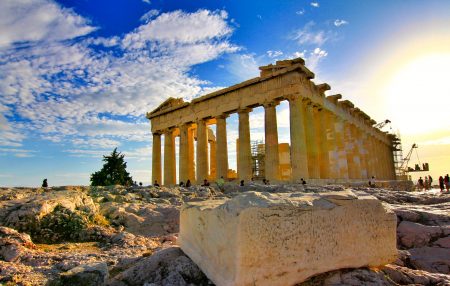I recently listened to a lecture addressing Tertullian’s enduring question, “What does Jerusalem have to do with Athens?” In other words, how does the divinely revealed gospel relate to pagan philosophy?
Most people, at least in the church, will answer the question with recourse to Colossians 2:8-10. What they say about it, however, differs greatly. Here is the Colossians text, followed by some reflection on its implications for contemporary faith.
See to it that no one takes you captive by philosophy and empty deceit, according to human tradition, according to the elemental spirits of the world, and not according to Christ. For in him the whole fullness of deity dwells bodily, and you have been filled in him, who is the head of all rule and authority. Colossians 2:8-10
Infamous are university professors who delight in stripping their students of admiration for “the faith once for all delivered to the saints,” luring them instead toward secular “isms,” such as atheistic existentialism, Marxism, naturalism, hedonism, relativism, and pantheism. So it is common for a parent, pastor, or youth leader to implore the departing freshman to keep his Christian wits about him—even using the exact words of Colossians 2:8-10.
It’s noteworthy that in ancient times, all non-scriptural study, including science, went under the name “philosophy.” As mathematical exactness and theoretical testability entered various fields, “natural philosophy” spawned “physics,” “chemistry,” and “astronomy.” Today, a vestige of that tradition can be found at graduations, where scholars are awarded doctorates of philosophy (Ph.D.s) in biology and geology. So in Paul’s day, “philosophy” could refer to all sorts of speculation about the universe.
When he spoke of “philosophy and empty deceit” (v. 8), Paul may have had in mind materialistic Epicureans and Stoics, such as he encountered at Mars Hill in Acts 17. He may have been thinking of Incarnation-denying Gnostics or latter-day disciples of such Greek cosmologists as Empedocles (who said all things are a combination of earth, air, fire, and water) and Pythagoras (whose metaphysics put math and not God at the center of everything). Whatever the error, it was the unfortunate product of naturalistic imagination.
Of course, the word “philosophy” is admirable enough; philosophia simply means “love of wisdom,” and the Bible itself is stocked with “wisdom literature,” such as one finds in Proverbs. The problem arises when the gospel of Christ is excluded from one’s worldview (or when it’s inadequately informed by Scripture), for then the whole picture of reality becomes skewed. Though some college professors teach that abandoning the Bible is a step toward sophistication, it is indeed a plunge into foolishness. Christ is Lord of all (v. 10). Missing that fact, the mind is capable of boundless confusion.
Fortunately, in the centuries since Paul’s day, Christian philosophers have arisen to glean truth from the writings of their secular counterparts, to treat great themes from a Christian perspective, and to defend the faith from the attacks of skeptics. Names like Augustine, Aquinas, Pascal, Leibniz, Berkeley, Maritain, and Plantinga ring out, along with many others.
It is a great blessing to the Church that we now have so many Christian publishers and websites addressing a wide range of issues. Pastors now have, at our disposal, a wealth of apologetic material and books on the integration of faith and learning. Of course, we need to reiterate Paul’s warning to the Colossians, but, as we do, we also equip the saints to detect and counter sub-Christian ideas—and to build up our own thinking, on every subject, toward Christ. Thus, Athens can serve to illumine the truth and beauty of Jerusalem, without having to necessarily trample upon it.





